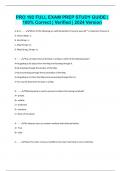Exam (elaborations)
PRO 192 FULL EXAM PREP STUDY GUIDE | 100% Correct | Verified | 2024 Version
A, B, D - - - - Which of the following are valid declarations? Assume .* is imported. (choose 3)
A. Vector<Map> v;
B. Set<String> s;
C. Map<String> m;
D. Map<String, String> m;
A - - - - You can determine all the keys in a Map in which of the following ways?
A⦁ By ge...
[Show more]
Preview 4 out of 217 pages
-
June 9, 2024
-
217
-
2023/2024
-
Exam (elaborations)
-
Questions & answers
-
PRO 192 FULL
-
PRO 192 FULL
PRO 192 FULL EXAM PREP STUDY GUIDE | 100% Correct | Verified | 2024 Version A, B, D - - - - ✔✔Which of the following are valid declarations? Assume java.util.* is imported. (choose 3) A. Vector<Map> v; B. Set<String> s; C. Map<String> m; D. Map<String, String> m; A - - - - ✔✔You can determine all the keys in a Map in which of the following ways? A⦁ By getting a Set object from the Map and iterating through it. B⦁ By iterating through the Iterator of the Map. C⦁ By enumerating through the Enumeration of the Map. D⦁ By getting a List from the Map and enumerating through the List. E⦁ You cannot determine the keys in a Map D - - - - ✔✔What keyword is used to prevent an object from being serialized? A ⦁ private B ⦁ volatile C ⦁ protected D ⦁ transient E ⦁ None of the above A - - - - ✔✔An abstract class can contain methods with declared bodies. A ⦁ True B ⦁ False E - - - - ✔✔Select the order of access modifiers from least restrictive to most restrictive. A ⦁ public, private, protected, default B ⦁ default, protected, private, public C ⦁ public, default, protected, private D ⦁ default, public, protected, private E ⦁ public, protected, default, private C - - - - ✔✔Which access modifier allows you to access method calls in libraries not created in Java? A ⦁ public B ⦁ static C ⦁ native D ⦁ transient E ⦁ volatile D - - - - ✔✔Which of the following statements are true? (Select all that apply.) A ⦁ A final object's data cannot be changed. B ⦁ A final class can be subclassed. C ⦁ A final method cannot be overloaded. D ⦁ A final object cannot be reassigned a new address in memory. E ⦁ None of the above. A - - - - ✔✔The keyword extends refers to what type of relationship? A ⦁ "is a" B ⦁ "has a" C ⦁ "was a" D ⦁ "will be a" E ⦁ None of the above B - - - - ✔✔Which of the following keywords is used to invoke a method in the parent class? A ⦁ this B ⦁ super C ⦁ final D ⦁ static C - - - - ✔✔Given the following code, what will be the outcome? public class Funcs extends java.lang.Math { public int add(int x, int y) { return x + y; } public int sub(int x, int y) { return x - y; } public static void main(String [] a) { Funcs f = new Funcs(); System.out.println("" + f.add(1, 2)); } } A ⦁ The code compiles but does not output anything. B ⦁ "3" is printed out to the console. C ⦁ The code does not compile. D ⦁ None of the above. D - - - - ✔✔Given the following code, what is the expected outcome? public class Test { public static void main(String [] a) { int [] b = [1,2,3,4,5,6,7,8,9,0]; System.out.println("a[2]=" + a[2]); } } A ⦁ The code compiles but does not output anything. B ⦁ "a[2]=3" is printed out to the console. C ⦁ "a[2]=2" is printed out to the console. D ⦁ The code does not compile. E ⦁ None of the above. D - - - - ✔✔What is the value of x after the following operation is performed? x = 23 % 4; A. 23 B. 4 C. 5.3 D. 3 E. 5 C - - - - ✔✔Given the following code, what keyword must be used at line 4 in order to stop execution of the for loop? boolean b = true; for (;;) { if (b) { <insert code> } // do something } A ⦁ stop B ⦁ continue C ⦁ break D ⦁ None of the above B - - - - ✔✔What method call is used to tell a thread that it has the opportunity to run?




